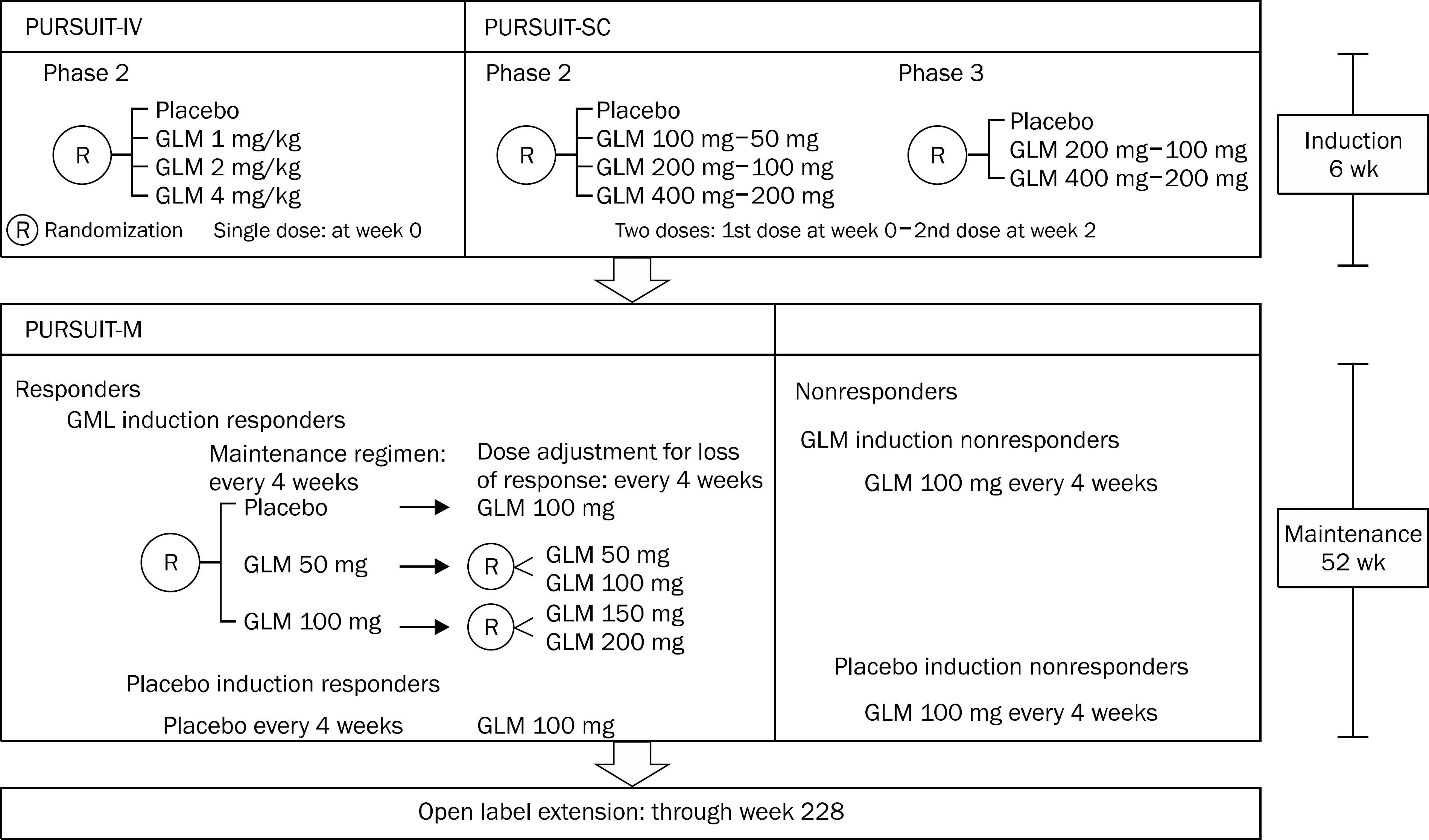1. Danese S, Fiocchi C. Ulcerative colitis. N Engl J Med. 2011; 365:1713–1725.

3. Loftus EV Jr. Clinical epidemiology of inflammatory bowel disease: incidence, prevalence, and environmental influences. Gastroenterology. 2004; 126:1504–1517.

4. Hanauer SB. Inflammatory bowel disease: epidemiology, pathogenesis, and therapeutic opportunities. Inflamm Bowel Dis. 2006; 12(Suppl 1):S3–S9.

5. Kim HJ, Hann HJ, Hong SN, et al. Incidence and natural course of inflammatory bowel disease in Korea, 2006–2012: a nationwide population-based study. Inflamm Bowel Dis. 2015; 21:623–630.
6. Danese S, Fiorino G, Peyrin-Biroulet L, et al. Biological agents for moderately to severely active ulcerative colitis: a systematic review and network metaanalysis. Ann Intern Med. 2014; 160:704–711.
7. Samaan MA, Bagi P, Vande Casteele N, D'Haens GR, Levesque BG. An update on anti-TNF agents in ulcerative colitis. Gastroenterol Clin North Am. 2014; 43:479–494.

8. Campas-Moya C. Golimumab: a novel anti-TNF-alpha human monoclonal antibody for rheumatoid arthritis, psoriatic arthritis and ankylosing spondylitis. Drugs Today (Barc). 2010; 46:13–22.
9. Hutas G. Golimumab as the first monthly subcutaneous fully human anti-TNF-alpha antibody in the treatment of inflammatory arthropathies. Immunotherapy. 2010; 2:453–460.
10. Shealy DJ, Cai A, Staquet K, et al. Characterization of golimumab, a human monoclonal antibody specific for human tumor necrosis factor alpha. MAbs. 2010; 2:428–439.
11. Gilardi D, Fiorino G, Allocca M, Bravatà I, Danese S. Golimumab: clinical update on its use for ulcerative colitis. Drugs Today (Barc). 2015; 51:171–184.

12. Cesarini M, Fiorino G. Leukocyte traffic control: a novel therapeutic strategy for inflammatory bowel disease: an update. Expert Rev Clin Immunol. 2013; 9:301–306.
13. Danese S. Nonimmune cells in inflammatory bowel disease: from victim to villain. Trends Immunol. 2008; 29:555–564.

14. Paleolog E. Target effector role of vascular endothelium in the inflammatory response: insights from the clinical trial of anti-TNF alpha antibody in rheumatoid arthritis. Mol Pathol. 1997; 50:225–233.

15. Martin PL, Oneda S, Treacy G. Effects of an anti-TNF-alpha monoclonal antibody, administered throughout pregnancy and lactation, on the development of the macaque immune system. Am J Reprod Immunol. 2007; 58:138–149.
16. Cohen LB, Nanau RM, Delzor F, Neuman MG. Biologic therapies in inflammatory bowel disease. Transl Res. 2014; 163:533–556.

17. Ling J, Lyn S, Xu Z, et al. Lack of racial differences in the pharmacokinetics of subcutaneous golimumab in healthy Japanese and Caucasian male subjects. J Clin Pharmacol. 2010; 50:792–802.

18. Sandborn WJ, Feagan BG, Marano C, et al. PURSUIT-SC Study Group. Subcutaneous golimumab induces clinical response and remission in patients with moderate-to-severe ulcerative colitis. Gastroenterology. 2014; 146:85–95.

19. Xu Z, Vu T, Lee H, et al. Population pharmacokinetics of golimumab, an anti-tumor necrosis factoralpha human monoclonal antibody, in patients with psoriatic arthritis. J Clin Pharmacol. 2009; 49:1056–1070.
20. Xu Z, Wang Q, Zhuang Y, et al. Subcutaneous bioavailability of golimumab at 3 different injection sites in healthy subjects. J Clin Pharmacol. 2010; 50:276–284.

21. Xu ZH, Lee H, Vu T, et al. Population pharmacokinetics of golimumab in patients with ankylosing spondylitis: impact of body weight and immunogenicity. Int J Clin Pharmacol Ther. 2010; 48:596–607.

22. Zhou H, Jang H, Fleischmann RM, et al. Pharmacokinetics and safety of golimumab, a fully human anti-TNF-alpha monoclonal antibody, in subjects with rheumatoid arthritis. J Clin Pharmacol. 2007; 47:383–396.
23. Zhuang Y, Lyn S, Lv Y, et al. Pharmacokinetics and safety of golimumab in healthy Chinese subjects following a single subcutaneous administration in a randomized phase I trial. Clin Drug Investig. 2013; 33:795–800.

24. Zhuang Y, Xu Z, Frederick B, et al. Golimumab pharmacokinetics after repeated subcutaneous and intravenous administrations in patients with rheumatoid arthritis and the effect of concomitant methotrexate: an open-label, randomized study. Clin Ther. 2012; 34:77–90.

25. Sandborn WJ, Feagan BG, Marano C, et al. PURSUIT- Maintenance Study Group. Subcutaneous golimumab maintains clinical response in patients with moderate-to-severe ulcerative colitis. Gastroenterology. 2014; 146:96–109.e1.

26. Smolen JS, Kay J, Doyle MK, et al. GO-AFTER study investigators. Golimumab in patients with active rheumatoid arthritis after treatment with tumour necrosis factor alpha inhibitors (GO-AFTER study): a multicentre, randomised, double-blind, placebo-controlled, phase III trial. Lancet. 2009; 374:210–221.
27. Smolen JS, Kay J, Landewé RB, et al. Golimumab in patients with active rheumatoid arthritis who have previous experience with tumour necrosis factor inhibitors: results of a long-term extension of the randomised, double-blind, placebo-controlled GO-AFTER study through week 160. Ann Rheum Dis. 2012; 71:1671–1679.

28. Williams CJ, Peyrin-Biroulet L, Ford AC. Systematic review with metaanalysis: malignancies with antitumour necrosis factor-a therapy in inflammatory bowel disease. Aliment Pharmacol Ther. 2014; 39:447–458.
29. Rutgeerts P, Feagan BG, Marano CW, et al. PURSUIT-IV study group. Randomised clinical trial: a placebo-controlled study of intravenous golimumab induction therapy for ulcerative colitis. Aliment Pharmacol Ther. 2015; 42:504–514.

30. Lopez-Olivo MA, Tayar JH, Martinez-Lopez JA, et al. Risk of malignancies in patients with rheumatoid arthritis treated with biologic therapy: a metaanalysis. JAMA. 2012; 308:898–908.
31. Xu Z, Marciniak SJ Jr, Frederick B, et al. Pharmacokinetic bridging approach for developing biologics-delivery devices: a case study with a golimumab autoinjector. Clin Ther. 2015; 37:427–438.

32. Castro Laria L, Argüelles Arias F, García Sánchez V, et al. Initial experience with golimumab in clinical practice for ulcerative colitis. Rev Esp Enferm Dig. 2016. DOI:
doi: 10.17235/reed.2016.4068/2015. [Epub ahead of print].

33. Detrez I, Dreesen E, Van Stappen T, et al. Variability in golimumab exposure: a ‘real-life’ observational study in active ulcerative colitis. J Crohns Colitis. 2016. DOI:
doi: 10.1093/ecco-jcc/jjv241. [Epub ahead of print].

34. Toor K, Druyts E, Jansen JP, Thorlund K. Cost per remission and cost per response with infliximab, adalimumab, and golimumab for the treatment of moderately-to-severely active ulcerative colitis. J Med Econ. 2015; 18:437–446.

35. Stidham RW, Lee TC, Higgins PD, et al. Systematic review with network metaanalysis: the efficacy of antitumour necrosis factoralpha agents for the treatment of ulcerative colitis. Aliment Pharmacol Ther. 2014; 39:660–671.

36. Galván-Banqueri M, Vega-Coca MD, Castillo-Muñoz MA, Beltrán Calvo C, Molina López T. Indirect comparison for Anti-TNF drugs in moderate to severe ulcerative colitis. Farm Hosp. 2015; 39:80–91.





 PDF
PDF ePub
ePub Citation
Citation Print
Print


 XML Download
XML Download